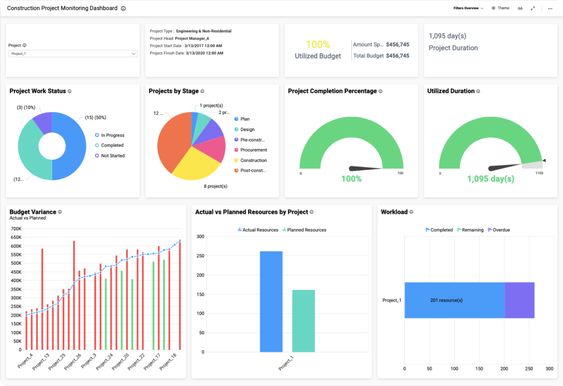As a construction project manager, it is vital to have a clear understanding of Key Performance Indicators (KPIs). KPIs are essential metrics that are used to measure the success of a project. With the use of KPIs, project managers can track progress and identify areas that need improvement. In this article, we’ll explore what KPIs are and how they are used in project management.
What are KPIs in Construction Project Management?
KPIs in construction project management are measurable values that are used to track and evaluate progress. These indicators may vary depending on the specific project and industry, but the goal is the same – to ensure that the project is progressing as planned. By tracking KPIs, project managers can determine whether a project is on track to meet its goals or whether corrective actions need to be taken.
Why are KPIs important in Construction Project Management?
KPIs are important in construction project management for several reasons. First, they provide a clear way for project managers to measure progress. Second, KPIs help to identify areas that need improvement. Third, KPIs enable project managers to make informed decisions based on data rather than assumptions.
Types of KPIs in Construction Project Management
There are several types of KPIs that are used in construction project management. Here are some of the most common:
– Schedule Performance Index (SPI) – measures the progress of the project against the planned schedule.
– Cost Performance Index (CPI) – measures the progress of the project against the planned budget.
– Return on Investment (ROI) – measures the expected return on investment for the project.
– Safety Performance – measures the project’s safety record and any incidents that may have occurred.
– Quality Control – measures the quality of the work that has been completed.
Implementing KPIs in Construction Project Management
To implement KPIs in construction project management, project managers must first identify the metrics that need to be tracked. This will depend on the specific project and its goals. Once the metrics have been identified, project managers must establish a process for collecting data and tracking progress. It is important to ensure that the data collection process is consistent and accurate.
Benchmarking with KPIs
One of the benefits of using KPIs in construction project management is that they provide a way to benchmark progress against industry standards. By comparing project performance to industry standards, project managers can identify areas that need improvement and develop strategies to address them.
Benefits of Using KPIs in Construction Project Management
There are several benefits to using KPIs in construction project management. These include:
– Improved decision-making based on data and facts
– Increased accountability for project outcomes
– Better communication and collaboration between team members
– Increased productivity and efficiency
– Reduced risk of project failure
Challenges in Implementing KPIs in Construction Project Management
While there are many benefits to using KPIs in construction project management, there are also challenges to implementation. One of the most significant challenges is determining which metrics to track. With so many different metrics to choose from, it can be challenging to identify the right ones for a particular project. Another challenge is ensuring that data is accurate and consistent.
You might find these FREE courses useful
- What Is a Scrum Master (and How Do I Become One)?
- Scrum Master Certification Exam Preparation
- Introduction to Scrum Master Training
- Scrum Master Certification Practice
Conclusion
KPIs are essential metrics used in construction project management to measure progress and identify areas that need improvement. While there are many different types of KPIs to choose from, project managers must determine which metrics are most relevant to their specific project. By implementing KPIs, project managers can make informed decisions based on data and facts, increase productivity and efficiency, and reduce the risk of project failure.
